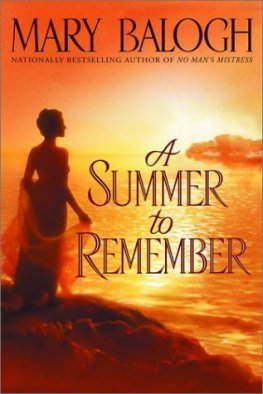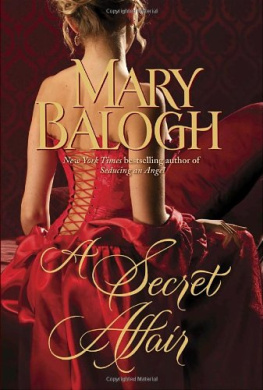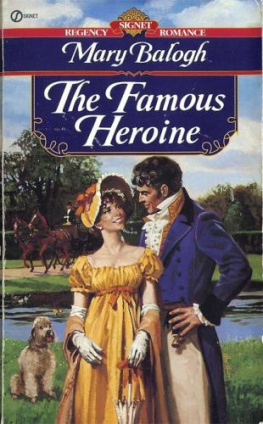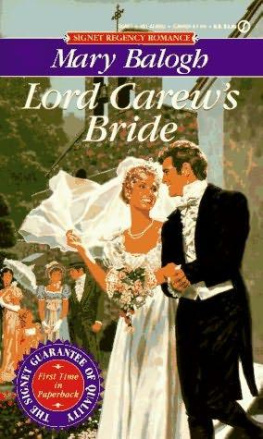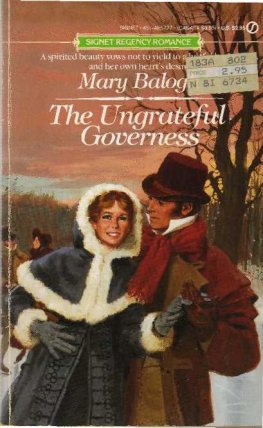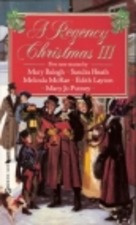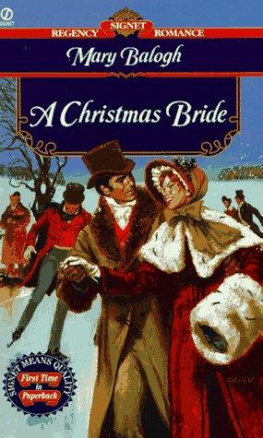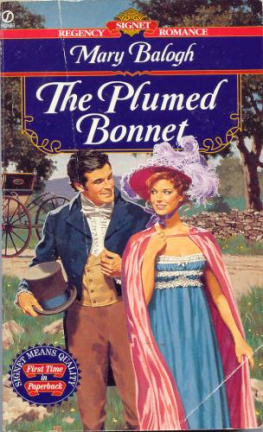Mary Balogh - Slightly Sinful
Here you can read online Mary Balogh - Slightly Sinful full text of the book (entire story) in english for free. Download pdf and epub, get meaning, cover and reviews about this ebook. year: 2004, publisher: Bantam Dell, genre: Prose. Description of the work, (preface) as well as reviews are available. Best literature library LitArk.com created for fans of good reading and offers a wide selection of genres:
Romance novel
Science fiction
Adventure
Detective
Science
History
Home and family
Prose
Art
Politics
Computer
Non-fiction
Religion
Business
Children
Humor
Choose a favorite category and find really read worthwhile books. Enjoy immersion in the world of imagination, feel the emotions of the characters or learn something new for yourself, make an fascinating discovery.

- Book:Slightly Sinful
- Author:
- Publisher:Bantam Dell
- Genre:
- Year:2004
- Rating:3 / 5
- Favourites:Add to favourites
- Your mark:
- 60
- 1
- 2
- 3
- 4
- 5
Slightly Sinful: summary, description and annotation
We offer to read an annotation, description, summary or preface (depends on what the author of the book "Slightly Sinful" wrote himself). If you haven't found the necessary information about the book — write in the comments, we will try to find it.
Slightly Sinful — read online for free the complete book (whole text) full work
Below is the text of the book, divided by pages. System saving the place of the last page read, allows you to conveniently read the book "Slightly Sinful" online for free, without having to search again every time where you left off. Put a bookmark, and you can go to the page where you finished reading at any time.
Font size:
Interval:
Bookmark:
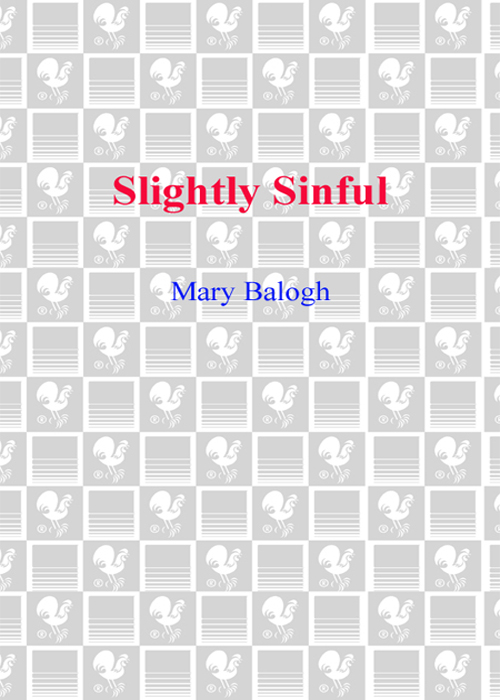
S LIGHTLY
S INFUL

M ARY
B ALOGH
A DELL BOOK
Contents
C HAPTER I

H AVING SPENT ALMOST ALL OF HIS TWENTY-five years in England and therefore isolated from most of the hostilities that had ravaged the rest of Europe since the rise to power of Napolon Bonaparte, Lord Alleyne Bedwyn, third brother of the Duke of Bewcastle, had no personal experience of pitched battles. But he had listened with avid interest to the war stories sometimes told by his elder brother, Lord Aidan Bedwyn, a recently retired cavalry colonel, and had thought he could picture such a scene.
He had been wrong.
He had imagined neatly deployed lines, the British and her allies on this side, the enemy on that, flat land like the playing fields of Eton between them. He had imagined cavalry and infantry and artillery, all pristine and picturesque in their various uniforms, moving about neatly and logically, like the pieces on a chessboard. He had imagined the rapid popping of gunfire, disturbing, but not obliterating, the silence. He had imagined clarity of vision, the ability to see all points of the battlefield at all times, the ability to assess the progress of the battle at every moment. He had imaginedif he had thought of it at allclean, clear air to breathe.
He had been wrong on all counts.
He was not himself a military man. Recently he had decided that it was time he did something useful with his life and had embarked upon a career as a diplomat. He had been assigned to the embassy at the Hague under Sir Charles Stuart. But Sir Charles and a number of his staff, Alleyne included, had moved to Brussels while the Allied armies under the Duke of Wellingtons command gathered there in response to a new threat from Napolon Bonaparte, who had escaped from his exile on the island of Elba earlier in the spring and was raising a formidable army in France again. Now, today, the long-expected battle between the two forces was being fought on a rolling, hilly stretch of farmland south of the village of Waterloo. And Alleyne was there in the thick of it. He had volunteered to carry a letter from Sir Charles to Wellington and to bring back a reply.
He was thankful that he had ridden out from Brussels alone. He might have been unable to hide from any companion the fact that he had never been even half so frightened in his life.
The noise of the great guns was the worst. It went beyond sound. It deafened his eardrums and pounded low in his abdomen. Then there was all the smoke, which choked his lungs and set his eyes to watering and made it virtually impossible to see clearly more than a few yards in any direction. There were horses and men milling about everywhere in the mud caused by last nights torrential rain, in what seemed like total confusion to Alleyne. There were officers and sergeants bellowing out commands and somehow making themselves heard. There was the acrid smell of smoke and the added stench of what he assumed must be blood and guts. Even through the smoke he could see dead and wounded wherever he looked.
It was like a scene straight from hell.
This, he realized, was the reality of war.
The Duke of Wellington had a reputation for always being in the place where the fighting was most fierce, recklessly exposing himself to danger and somehow escaping unscathed. Today was no exception. After asking at least a dozen officers for information concerning his whereabouts, Alleyne finally found his man on an open rise of land looking down on the strategically placed farmhouse of La Haye Sainte, which the French were fiercely attacking and a troop of German soldiers was just as ferociously defending. The duke could not have been more openly exposed to enemy fire if he had tried. Alleyne delivered his letter and then concentrated his attention upon keeping his horse under control. He tried not even to think of the danger to his person, but he was painfully aware of the roar of cannonballs close by and the whistle of musket balls. Terror seeped into his very bones.
He had to wait for Wellington to read the letter and then dictate a reply to one of his aides. The wait seemed interminable to Alleyne, who watched the battle for control of the farmwhenever he could see it through the billowing smoke of thousands of guns. He watched men die and waited to die himself. And if he survived, he wondered, would he ever hear again? Or be sane again? Finally he had his letter, stowed it safely in an inner pocket, and turned to leave. He had never been more thankful for anything in his life.
How had Aidan tolerated this life for twelve years? By what miracle had he survived to tell of it and to marry Eve and settle to a life in rural England?
When he felt a sharp pain in his upper left thigh, Alleyne thought at first that he had twisted awkwardly in the saddle and pulled a muscle. But when he glanced down, he saw the torn hole in his breeches and the blood spurting from it and realized the truth almost as if he were a spectator looking down dispassionately upon himself.
By Jove, he said aloud, I have been hit.
His voice sounded as if it came from a long way distant. It was drowned out by the pounding of the guns and his fuzzy-eared deafness and by the ringing sound within his head, suddenly turned icy cold with the shock of knowing that he had been shot.
It did not occur to him to stop or dismount or seek medical attention. He could think only of getting away from there, of returning without delay to Brussels and safety. He had important things to do there. For the moment he could not remember what any of those things were, but he knew he could not afford to delay.
Besides, panic was clawing at his back.
He rode onward for a few minutes, until he felt more confident of being out of harms way. By that time his leg was hurting like the very devil. Worse, he was still bleeding copiously. He had nothing with which to bind the wound except a large handkerchief. When he pulled it out of his pocket he feared that it would not reach about his thigh, but corner-to-corner it was longer than he had estimated. With clammy, shaking hands he bound it tightly above the tear in his breeches, wincing and nearly fainting from the pain. The ball, he realized, must be embedded in his thigh. Agony tore through him with every pulse beat. He was dizzy with shock.
Thousands of men were wounded far worse than this, he told himself sternly as he rode onfar worse. It would be cowardly to dwell upon his own pain. He must force himself to rise above it. Once he had reached Brussels, he would complete his errand and then get a physician to dig out the ballperish the thought!and patch him up. He would survivehe hoped. So would his leghe hoped.
Soon he was in the Forest of Soigns, riding a little to the west side of the road in order to avoid all the heavy traffic proceeding along it in both directions. He passed numerous soldiers in the forest, a few of them dead, many of them wounded like himself, a large number of them deserters from the horror of the battlefrontor so he suspected. He could hardly blame them.
As the shock gradually subsided, the pain grew steadily worse, if that were possible. The bleeding, though somewhat retarded by the tourniquet he had fashioned, continued. He felt cold and light-headed. He had to get back to Morgan.
Font size:
Interval:
Bookmark:
Similar books «Slightly Sinful»
Look at similar books to Slightly Sinful. We have selected literature similar in name and meaning in the hope of providing readers with more options to find new, interesting, not yet read works.
Discussion, reviews of the book Slightly Sinful and just readers' own opinions. Leave your comments, write what you think about the work, its meaning or the main characters. Specify what exactly you liked and what you didn't like, and why you think so.

